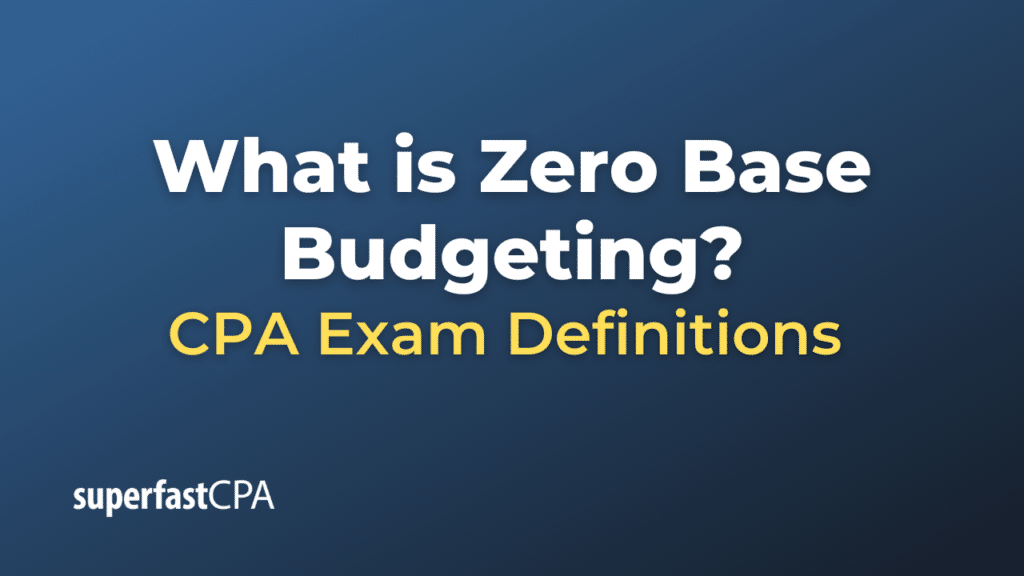Zero Base Budgeting
Zero-Based Budgeting (ZBB) is a budgeting method that requires each department or business unit to justify all its costs from scratch for each new period. Unlike traditional budgeting, where past budgets serve as the basis for the next period’s budget, zero-based budgeting starts from a “zero base” and every function, operation, and expenditure needs to be analyzed and justified anew. The budget is then built around what is needed for the upcoming period, regardless of whether the budget is higher or lower than the previous one.
Advantages of Zero-Based Budgeting:
- Cost Control: ZBB encourages a closer examination of expenditures, which can lead to the elimination of unnecessary or redundant costs.
- Resource Allocation: It encourages a more efficient allocation of resources, as it looks at the needs and benefits of different functions rather than their historical budgets.
- Strategic Alignment: ZBB can be used to align spending with strategic objectives by funding areas with the highest returns or the most critical needs.
Disadvantages of Zero-Based Budgeting:
- Time-Consuming: The process can be labor-intensive and time-consuming since every budget line item has to be reviewed and justified.
- Complexity: The method may be too complicated for smaller businesses or for organizations that don’t change much from year to year.
- Employee Morale: Continuous scrutiny and the potential for budget cuts can sometimes lead to lower employee morale.
Example of Zero Base Budgeting
Let’s consider a more detailed example of Zero-Based Budgeting (ZBB) in action for a fictional company named “EcoGardens,” which sells gardening supplies online. Assume that the financial year is coming to a close, and the company is preparing its budget for the next year.
EcoGardens had a marketing budget of $200,000 last year. This year, rather than simply incrementing the previous year’s budget, they decide to use zero-based budgeting. The marketing department must now justify every expense for the new financial year, starting from a “zero base.”
Steps in Zero-Based Budgeting
- Identify Objectives: The first step is to outline what the marketing department wants to achieve. Let’s say the goals are to increase website traffic by 20% and boost sales by 15%.
- List Activities and Costs: The marketing team lists all the activities they plan to undertake to achieve these objectives along with their estimated costs.
- Social Media Ads: $50,000
- Email Marketing Campaigns: $25,000
- SEO and Content Marketing: $40,000
- Influencer Partnerships: $30,000
- Customer Retention Programs: $20,000
- Miscellaneous (software, training, etc.): $15,000
- Justify Each Expense: For each activity, the team prepares a justification.
- Social Media Ads: Last year’s data showed a strong ROI for social media advertising.
- Email Marketing: Email has historically had a high conversion rate.
- SEO and Content Marketing: Necessary to maintain and improve website ranking.
- Influencer Partnerships: A new initiative based on successful pilot tests.
- Customer Retention Programs: Retaining a customer is cheaper than acquiring a new one.
- Miscellaneous: Essential tools and training for the marketing team.
- Review and Prioritize: After justifications are prepared, the activities are ranked by their expected impact on the company’s goals.
- Compile and Approve the Budget: The budget is then compiled based on these justifications and priorities. It is submitted for approval to upper management.
After rigorous scrutiny, EcoGardens decides to approve a marketing budget of $180,000 for the year. This is $20,000 less than last year, but each cost is now justified and aligned with the company’s objectives.
Key Takeaways
- The marketing department had to justify every single expense.
- By cutting out unnecessary costs and focusing on high-impact activities, the department is able to operate on a smaller budget than the previous year while still aiming to achieve its goals.
This example demonstrates how Zero-Based Budgeting can help a company to efficiently allocate its resources by compelling each department to justify and prioritize its expenses.













